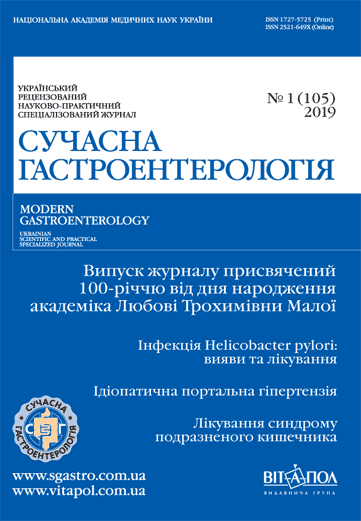Роль запалення та протизапальної терапії при синдромі подразненого кишечника (огляд та результати власного дослідження)
DOI:
https://doi.org/10.30978/MG-2019-1-113Ключові слова:
синдром подразненого кишечника, запалення, протизапальне лікуванняАнотація
Представлено сучасні дані щодо патогенетичної ролі запалення слизової оболонки кишечника при синдромі подразненого кишечника (СПК). Показано, що при деяких субтипах СПК, особливо при постінфекційному СПК, запалення може відігравати ключову роль у розвитку слабоінтенсивної запальної реакції та появі симптоматики. У виникненні такого запалення важливе значення мають опасисті клітини, дисфункція кишкового бар’єра, кишкові патогени і генетична схильність. У хворих із СПК запальний процес може бути складовою патогенезу захворювання, що потребує вивчення. Патогенетичне лікування СПК може передбачати застосування протизапальних засобів, таких як месалазин, кетотифен і кромоглікат натрію, стероїди, омалізумаб. Проведене нами дослідження продемонструвало, що додаткове до стандартної базисної терапії призначення монтелукасту в комбінації з хіфенадином підвищувало ефективність лікування хворих із СПК із супутніми алергійними захворюваннями, особливо у разі СПК із діареєю, зокрема, зменшувало як алергійні, так і гастроентерологічні вияви, статистично значущо знижувало інтенсивність больового та діарейного синдрому, а також підвищувало показники загального стану здоров’я, життєвої активності та фізичного стану пацієнтів. Це відбувалось завдяки тому, що комбінація зазначених препаратів блокує медіатори запалення, які містяться в опасистих клітинах, та, окрім протисвербіжної та десенсибілізувальної дії, знімає або послаблює констрикторний і спазмувальний вплив гістаміну на гладенькі м’язи кишечника. Хіфенадин має помірний протисеротоніновий ефект, що, враховуючи патофізіологічні механізми, має важливе значення при СПК. Тому використання комбінації антилейкотрієнових і антигістамінних препаратів разом з базисною терапією у пацієнтів із СПК, котрі мають супутні алергійні захворювання, дає позитивний клінічний та лабораторний результат, проте потребує додаткового вивчення.
Посилання
Akiho H, Ihara E, Nakamura K. Low-grade inflammation plays a pivotal role in gastrointestinal dysfunction in irritable bowel syndrome. World J Gastrointest Pathophysiol. 2010;1(3):97-105. https://dx.doi.org/10.4291 %2Fwjgp.v1.i3.97
Barbara G, Cremon C, Annese V et al. Randomised controlled trial of mesalazine in IBS. Gut. 2016;65(1):82-90. https://doi.org/10.1136/gutjnl-2014-308188
Bashashati M, Rezaei N, Shafieyoun A et al. Cytokine imbalance in irritable bowel syndrome: a systematic review and meta-analysis. Neurogastroenterol Motil. 2014;26(7):1036-1048. DOI: 10.1111/nmo.12358
Bellini M, Gambaccini D, Stasi C et al. Irritable bowel syndrome: a disease still searching for pathogenesis, diagnosis and therapy. World J Gastroenterol 2014;20 (27):8807-8820. https://dx.doi.org/10.3748 %2Fwjg.v20.i27.8807
Chang MH, Chou JW, Chen SM et al. Faecal calprotectin as a novel biomarker for differentiating between inflammatory bowel disease and irritable bowel syndrome. Mol Med Rep. 2014;10(1):522-526. https://doi.org/10.3892/mmr.2014.2180
Corsetti M, Whorwell P. Novel pharmacological therapies for irritable bowel syndrome. Exp Rev Gastroenterol Hepatol. 2016;10(7):807-815. https://doi.org/10.1586/17474124.2016.1158099
Crentsil V. Will corticosteroids and other anti-inflammatory agents be effective for diarrhea-predominant irritable bowel syndrome?. Med Hypotheses. 2005;65(1):97-102. https://doi.org/10.1016/j.mehy.2004.07.042
Drossman DA. Functional gastrointestinal disorders: History, pathophysiology, clinical features, and Rome IV. Gastroenterol. 2016;150(6):1262-1279. https://doi.org/10.1053/j.gastro.2016.02.032
Dunlop SP, Jenkins D, Neal KR et al. Randomized, double-blind, placebo-controlled trial of prednisolone in post-infectious irritable bowel syndrome. Aliment Pharmacol Ther. 2003;18(1):77-84.
Fee WH. Irritable bowel syndrome helped by montelukast. Chest. 2002;122(4):1497.
Farzaei MH, Bahramsoltani R, Abdollahi M, Rahimi R. The role of visceral hypersensitivity in irritable bowel syndrome: pharmacological targets and novel treatments. J Neurogastroenterol Motil. 2016;22(4):558-574. Doi: 10.5056/jnm16001
Ford AC, Talley NJ. Mucosal inflammation as a potential etiological factor in irritable bowel syndrome: a systematic review. J Gastroenterol. 2011;46:421-431 [PMID: 21331765 DOI:10.1007/s00535-011-0379-9] https://doi.org/10.1007/s00535-011-0379-9
Gonsalkorale WM, Perrey C, Pravica V, Whorwell PJ, Hutchinson IV. Interleukin 10 genotypes in irritable bowel syndrome: evidence for an inflammatory component?. Gut. 2003;52(1):91-93.
Grover M. Role of gut pathogens in development of irritable bowel syndrome. Indian J Med Res. 2014;139(1):11-18.
Klooker TK, Braak B, Koopman KE et al. The mast cell stabiliser ketotifen decreases visceral hypersensitivity and improves intestinal symptoms in patients with irritable bowel syndrome. Gut. 2010;59(9):1213-1221. Doi: 10.1136/gut.2010.213108.
Macsharry J, O’Mahony L, Fanning A et al. Mucosal cytokine imbalance in irritable bowel syndrome. Scand J Gastroenterol. 2008;43 (12):1467-1476. Doi: 10.1080/00365520802276127.
Malagelada JR, Malagelada C. Mechanism-oriented therapy of irritable bowel syndrome. Adv Ther. 2016;33(6):877-893. https://doi.org/10.1007/s12325-016-0336-3
Martinez C, Gonzalez-Castro A, Vicario M, Santos J. Cellular and molecular basis of intestinal barrier dysfunction in the irritable bowel syndrome. Gut Liver. 2012;6(3):305-315. Doi: 10.5009/gnl.2012.6.3.305.
Menees SB, Powell C, Kurlander J, Goel A, Chey WD. A meta-analysis of the utility of C-reactive protein, erythrocyte sedimentation rate, fecal calprotectin, and fecal lactoferrin to exclude inflammatory bowel disease in adults with IBS. Am J Gastroenterol. 2015;110(3):444-454. Doi: 10.1038/ajg.2015.6.
Min T, Ford AC. Efficacy of mesalazine in IBS. Gut. 2016;65(1):187-188. Doi: 10.1136/gutjnl-2015-309593
Mondot S, Lepage P. The human gut microbiome and its dysfunctions through the Meta-omics prism. Ann N Y Acad Sci. 2016;1372(1):9-19. Doi: 10.1111/nyas.13033.
O’Sullivan M. Therapeutic potential of ketotifen in irritable bowel syndrome (IBS) may involve changes in mast cells at sites beyond the rectum. Gut. 2011;60(3):423. Doi: 10.1136/gut.2010.225078.
Pearson JS, Niven RM, Meng J, Atarodi S, Whorwell PJ. Immunoglobulin E in irritable bowel syndrome: another target for treatment? A case report and literature review. Therap Adv Gastroenterol. 2015;8(5):270-277. Doi: 10.1177/1756283X15588875
Ratanasirintrawoot S, Israsena N. Stem cells in the intestine: possible roles in pathogenesis of irritable bowel syndrome. J Neurogastroenterol Motil. 2016;22(3):367-382. https://doi.org/10.5056/jnm16023
Roostaee A, Benoit YD, Boudjadi S, Beaulieu JF. Epigenetics in intestinal epithelial cell renewal. J Cell Physiol. 2016;231 (11):2361-2367. Doi: 10.1002/jcp.25401
Sinagra E, Pompei G, Tomasello G et al. Inflammation in irritable bowel syndrome: myth or new treatment target?. World J Gastroenterol. 2016;22(7):2242-2255.
Törnblom H, Simren M. In search for a disease-modifying treatment in irritable bowel syndrome. Gut. 2016;65(1):2-3. Doi: 10.1136/gutjnl-2015-310024.
Vara EJ, Valeur J, Hausken T, Lied GA. Extraintestinal symptoms in patients with irritable bowel syndrome: related to high total IgE levels and atopic sensitization?. Scand J Gastroenterol. 2016;51(8):908-913. Doi: 10.3109/00365521.2016.1157890
Wang Q, Ding G, Xu X. Immunomodulatory functions of mesenchymal stem cells and possible mechanisms. Histol Histopathol. 2016;31(9):949-959. Doi: 10.14670/HH-11-750
Zhang L, Song J, Hou X. Mast cells and irritable bowel syndrome: from the bench to the bedside. J Neurogastroenterol Motil. 2016;22(2):181-192. https://doi.org/10.5056/jnm15137





